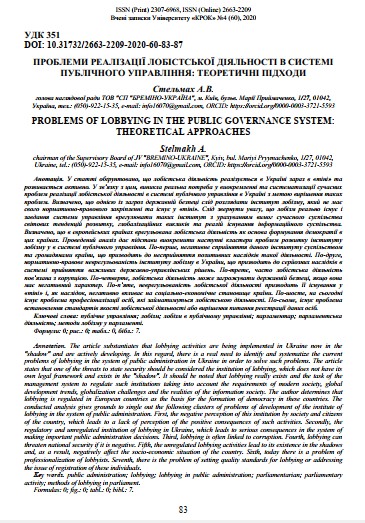PROBLEMS OF LOBBYING IN THE PUBLIC GOVERNANCE SYSTEM: THEORETICAL APPROACHES
DOI:
https://doi.org/10.31732/2663-2209-2020-60-83-87Keywords:
public administration, lobbying, lobbying in public administration, parliamentarian, parliamentary activity, methods of lobbying in parliamentAbstract
The article substantiates that lobbying activities are being implemented in Ukraine now in the "shadow" and are actively developing. In this regard, there is a real need to identify and systematize the current problems of lobbying in the system of public administration in Ukraine in order to solve such problems. The article states that one of the threats to state security should be considered the institution of lobbying, which does not have its own legal framework and exists in the "shadow". It should be noted that lobbying really exists and the task of the management system to regulate such institutions taking into account the requirements of modern society, global development trends, globalization challenges and the realities of the information society. The author determines that lobbying is regulated in European countries as the basis for the formation of democracy in these countries. The conducted analysis gives grounds to single out the following clusters of problems of development of the institute of lobbying in the system of public administration. First, the negative perception of this institution by society and citizens of the country, which leads to a lack of perception of the positive consequences of such activities. Secondly, the regulatory and unregulated institution of lobbying in Ukraine, which leads to serious consequences in the system of making important public administration decisions. Third, lobbying is often linked to corruption. Fourth, lobbying can threaten national security if it is negative. Fifth, the unregulated lobbying activities lead to its existence in the shadows and, as a result, negatively affect the socio-economic situation of the country. Sixth, today there is a problem of professionalization of lobbyists. Seventh, there is the problem of setting quality standards for lobbying or addressing the issue of registration of these individuals.
Downloads
References
Тихомирова Е. Б. Лоббизм как специфическая форма коммуникации с общественностью. Вестник Московского университета. Серия 18. Социология и политология. 2002. № 3. С. 113–127.
Кумс К. Лоббизм и его регулирование: советы британского эксперта. Бизнес и политика. 1994. № 1.
Росенко М. І. Лобізм і його роль в діяльності сучасних парламентів. шляхи удосконалення регламентації діяльності лобістів в парламенті України. Державне управління: удосконалення та розвиток. № 11, 2010. URL: http://www.dy.nayka.com.ua/?op=1&z=214.
Виговський Д. Суть лобізму як категорії політичної науки. Українська національна ідея: реалії та перспективи розвитку. 2008. Випуск 20. С. 42-48.
Ганжуров Ю. Парламентське лобіювання в контексті політичної комунікації. Політичний менеджмент. 2005. № (13). C. 50-62.
Головко В. Становлення лобізму в Україні: проблеми законодавчого регулювання. Гуманітарний журнал. 2012. № 4. URL: http://journals.uran.ua/index.php/wissn003/article/view/4939.
Вітвіцький С. С., Южека Р. С. Міжнародний досвід розвитку інституту лобізму та проблема його легалізації в Україні. «Молодий вчений». Серія: Юридичні науки. 2015. № 2 (17). С. 734-736.



